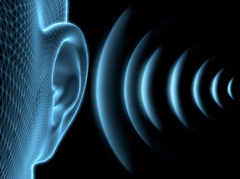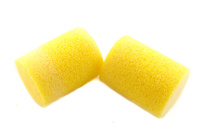Protect Your Ears
 I was talking to a friend recently and realized that our senses vary greatly in fragility. Generally speaking, taste, smell, sight and touch are fairly robust. Obviously we can lose our sense of touch through trauma, and there is similar risk for our eyesight. Our eyesight is also often imperfect from early in life and degrades later in life. Even so, what my friend and I discussed was how much more fragile our hearing is. It's the one sense we can severely damage from what we currently consider "normal" use.
I was talking to a friend recently and realized that our senses vary greatly in fragility. Generally speaking, taste, smell, sight and touch are fairly robust. Obviously we can lose our sense of touch through trauma, and there is similar risk for our eyesight. Our eyesight is also often imperfect from early in life and degrades later in life. Even so, what my friend and I discussed was how much more fragile our hearing is. It's the one sense we can severely damage from what we currently consider "normal" use.I knew all that, but just hadn't quite focused the thought. I've worn ear plugs since junior high school for band rehearsals, gigs and concerts. But this recent conversation clarified how unique the risk is with our hearing. Of course, I'm particularly concerned about exposure to loud music, anywhere from earbuds and headphones to movie theaters and concerts. Modern technology has made it easy to reproduce full bandwidth audio at ridiculously loud and dangerous volumes. The general consensus amongst audiologists is that prolonged exposure to sound at even 85 decibels (dB) for long periods is dangerous. Yet, many of the concerts you and I attend are amplified to levels well about 100 dB. It's easy to generate dangerous levels using earbuds or headphones, and even acoustic instruments in large quantities (symphonies or orchestras) can easily exceed 85 dB.
How loud is 85 dB? It's not really that loud. It isn't painful. It's actually right around the point when music starts sounding really good. At lower volumes our ears and brains don't perceive the music with as much liveliness and excitement. If you take a look at the chart included in this article about loudness you will see how our hearing frequency response doesn't really flatten out until we're listening to between 80 and 100 dB SPL. But remember, at that volume, our ears are at risk. If you don't have a sense for how loud 85 dB is, I suggest picking up a Radio Shack SPL meter, or purchasing an SPL measurement app for your iOS or Android device. Any of those will be accurate enough for your purposes, to just teach yourself what dangerous audio levels sound like.
Of course, music isn't the only risk. Ambient sound levels in many city settings can be unbelievably loud, combining un-muffled motorcycles, subways, jet planes and diesel trucks. Monster trucks and aerobatics shows can put you at risk as well. In fact, the act of living a modern lifestyle exposes you to hearing risk nearly every day.
So, why do so many people put themselves at risk? Well, unlike our other sense, the risk factors for hearing are part of normal daily life. We experience them while being entertained, while commuting and while working many normal jobs. That's in contrast to the risks to eyesight, smell, taste and touch, which are much more recognizable as unusual. Most of us don't have to worry about being blinded by excessively bright light, or physical injury that leads to loss of smell.
 It's hard to reconcile the fact that when you're just having a good time, you can put your hearing at severe risk. It's not "cool" to wear earplugs, and even the expensive ones alter the listening experience a bit. But, sometimes "cool" isn't really worth the risk. I'm willing to bet that Pete Townshend and Paul Gilbert would have worn hearing protection much earlier in life if they'd known the alternative was severe hearing loss. As musicians, I am guessing that each would have preferred to preserve as much of their hearing as possible before old age took its toll. That way they could hear the full bandwidth and texture of their own and others' music throughout their careers and lives.
It's hard to reconcile the fact that when you're just having a good time, you can put your hearing at severe risk. It's not "cool" to wear earplugs, and even the expensive ones alter the listening experience a bit. But, sometimes "cool" isn't really worth the risk. I'm willing to bet that Pete Townshend and Paul Gilbert would have worn hearing protection much earlier in life if they'd known the alternative was severe hearing loss. As musicians, I am guessing that each would have preferred to preserve as much of their hearing as possible before old age took its toll. That way they could hear the full bandwidth and texture of their own and others' music throughout their careers and lives.
If this is surprising information for you, please take the time to research hearing loss and raise your level of caution. I recommend beginning your reading here: Are You At Risk?. Then explore the rest of the information available on H.E.A.R's website. You will find some good information about purchasing musician's earplugs on their site. Keep in mind, you don't have to be a musician to buy high quality earplugs. In fact, if you are exposed to loud music as a fan, a music professional or even a regular moviegoer, musician's earplugs can help preserve your hearing. Etymotic also carries a wide array of hearing protection, much of it quite affordable. Take this seriously, please. When it comes to hearing loss, we live in a very dangerous world.
 Post a Comment → Posted on
Post a Comment → Posted on  Sunday, July 22, 2012 at 11:21PM
Sunday, July 22, 2012 at 11:21PM  ear plugs,
ear plugs,  ear protection,
ear protection,  hearing,
hearing,  hearing loss,
hearing loss,  loud music | in
loud music | in  Health,
Health,  Safety
Safety